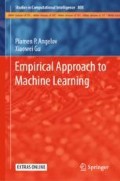Abstract
In this chapter, the concepts and general principles of the empirical fuzzy sets and the fuzzy rule-based (FRB) systems based on them, named empirical FRB systems are presented, and two approaches for identifying empirical FRB systems, namely, the subjective one, which is based on human expertise, and the objective one, which is based on the autonomous data partitioning algorithm, are also presented. The traditional fuzzy sets and systems suffer from the so-called “curse of dimensionality”, they heavily rely on ad hoc decision and lack objectiveness. In contrast, the empirical approach to identify the empirical fuzzy sets and FRB systems effectively combine the data- and human-derived models and minimize the involvement of human expertise. They have significant advantages over the traditional ones because of the very strong interpretability, high objectiveness, being data driven and free from prior assumptions.
Access this chapter
Tax calculation will be finalised at checkout
Purchases are for personal use only
References
E.H. Mamdani, S. Assilian, An experiment in linguistic synthesis with a fuzzy logic controller. Int. J. Man Mach. Stud. 7(1), 1–13 (1975)
T. Takagi, M. Sugeno, Fuzzy identification of systems and its applications to modeling and control. IEEE Trans. Syst. Man. Cybern. 15(1), 116–132 (1985)
R.R. Yager, D.P. Filev, Learning of fuzzy rules by mountain clustering, in SPIE Conference on Application of Fuzzy Logic Technology, 1993, pp. 246–254
P. Angelov, R. Yager, A new type of simplified fuzzy rule-based system. Int. J. Gen Syst. 41(2), 163–185 (2011)
P. Angelov, Autonomous Learning Systems: From Data Streams to Knowledge in Real Time (Wiley, Ltd., 2012)
P.P. Angelov, X. Gu, Empirical fuzzy sets. Int. J. Intell. Syst. 33(2), 362–395 (2017)
C.C. Aggarwal, A. Hinneburg, D.A. Keim, On the surprising behavior of distance metrics in high dimensional space, in International Conference on Database Theory, 2001, pp. 420–434
X. Gu, P.P. Angelov, J. C. Principe, A method for autonomous data partitioning, Inf. Sci. 460–461, 65–82 (2018)
A. Okabe, B. Boots, K. Sugihara, S.N. Chiu, Spatial Tessellations: Concepts and Applications of Voronoi Diagrams, 2nd edn. (Wiley, Chichester, England, 1999)
P. Angelov, An approach for fuzzy rule-base adaptation using on-line clustering. Int. J. Approx. Reason. 35(3), 275–289 (2004)
P.P. Angelov, D.P. Filev, An approach to online identification of Takagi-Sugeno fuzzy models, IEEE Trans. Syst. Man, Cybern. Part B Cybern. 34(1), 484–498 (2004)
P. Cortez, A. Silva, Using data mining to predict secondary school student performance, in 5th Annual Future Business Technology Conference, 2008, pp. 5–12
P.P. Angelov, X. Gu, J. Principe, D. Kangin, Empirical data analysis—a new tool for data analytics, in IEEE International Conference on Systems, Man, and Cybernetics, 2016, pp. 53–59
P. Angelov, X. Gu, D. Kangin, Empirical data analytics. Int. J. Intell. Syst. 32(12), 1261–1284 (2017)
Author information
Authors and Affiliations
Corresponding author
Rights and permissions
Copyright information
© 2019 Springer Nature Switzerland AG
About this chapter
Cite this chapter
Angelov, P.P., Gu, X. (2019). Empirical Fuzzy Sets and Systems. In: Empirical Approach to Machine Learning. Studies in Computational Intelligence, vol 800. Springer, Cham. https://doi.org/10.1007/978-3-030-02384-3_5
Download citation
DOI: https://doi.org/10.1007/978-3-030-02384-3_5
Published:
Publisher Name: Springer, Cham
Print ISBN: 978-3-030-02383-6
Online ISBN: 978-3-030-02384-3
eBook Packages: Intelligent Technologies and RoboticsIntelligent Technologies and Robotics (R0)

